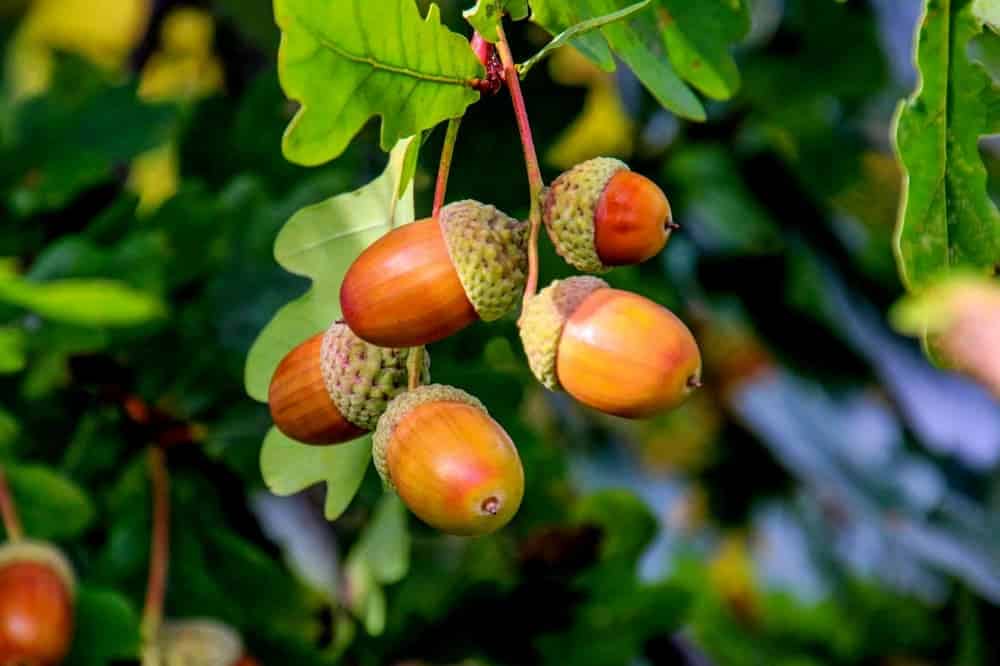Generally, it’s possible you’ll hardly discover you could have acorn-producing timber in your neighborhood. However each two to 5 years—throughout what’s known as “mast” years—oak timber launch considerable showers of acorns within the fall (1). After they ping-pong off your roof, scatter throughout your yard, and stain your driveway and sidewalks, it’s acorn season. With so many attention-grabbing new treats round, some canines may attempt to eat them.
If you happen to’ve been triggered by that traditional dog-got-into-something crunch, you’re in all probability questioning if a canine consuming acorns is one thing to fret about. Because it seems, these tree nuts usually are not a secure snack for canines. In some circumstances, they’ll even trigger severe well being problems. That’s why if there’s any indication your canine has been consuming acorns, it’s best to hearken to your intestine and name your veterinarian ASAP to determine subsequent steps.
Learn on to seek out out whether or not acorns are dangerous for canines, what to do in case your canine eats acorns, and find out how to forestall this dangerous habits.
Are Acorns Unhealthy for Canines?

A typical function of fall decor, acorns look fairly innocent. However these bitter-tasting tree nuts could be dangerous for our canine companions. “Some canines can have gastrointestinal upset from consuming acorns like vomiting, diarrhea, or an upset abdomen,” says Dr. Erin Ray, a scientific assistant professor of major care and normal surgical procedure at Texas A&M College Veterinary Medical Educating Hospital (2).
Are Acorns Toxic to Canines?
Acorns don’t simply flip your canine’s abdomen. You is perhaps shocked to study that acorns may also make canines dangerously sick.
Curiously, acorns are particularly poisonous to cattle and horses. That is possible attributable to excessive quantities of dangerous compounds known as tannins, that are product of tiny bits of toxic particles (3). Happily tannins are very bitter, which makes most canines suppose twice about taking a second chew.
Whereas there have been extra studies of significant problems in bigger animals, analysis suggests poisonous compounds present in acorns appear to affect canines in comparable methods. As such, regardless of the dimensions of your pup, it’s finest to maintain acorns off the menu.
Mature acorns—the brown ones that fall from timber—include toxins which might be dangerous for canines. However buds and immature inexperienced acorns really include the best focus of poisons. So be sure you maintain acorns of every type away out of your pup all year long.
4 Risks of Acorns for Canines

Whereas loads of canines aren’t excited about munching on acorns, it’s value figuring out what could occur in case your canine eats some and what to do.
Take into account that there are only a few studies of canines who get sick from acorns, regardless of how widespread acorns are and what number of canines have entry to them.
Listed here are a couple of potential well being hazards to know:
1. Acorn poisoning
Inside hours, toxins present in acorns can disrupt your canine’s potential to digest meals as they’re launched contained in the GI tract. Over time, they’ll additionally trigger severe injury to organs just like the kidneys and liver (3).
Though this doesn’t occur usually, there have been a handful of studies of sick canines exhibiting up on the veterinarian’s workplace with a stomach stuffed with acorns. In a single case, a pesky Labrador allowed to run free in his mother and father’ yard wolfed up round 10 to fifteen acorns. He later turned torpid and finally suffered from a bout of vomiting and diarrhea. Fortunately, with supportive therapy from a veterinarian, he was in a position to get out of the hazard zone and get better (3).
Whereas excessive, that is one clear instance of why pet mother and father shouldn’t ignore acorn-related well being issues. “If you happen to’re involved a canine has eaten acorns, you could go to the veterinarian,” says Dr. Nancy Welborn, an assistant professor of veterinary scientific sciences on the LSU Faculty of Veterinary Medication in Baton Rouge.
With subsequent steps like a bodily examination, belly palpation, bloodwork, and imaging, your veterinarian can decide the most effective plan of action to guard your pet.
2. Gastrointestinal blockage
One of the vital frequent causes veterinarians see canines for acorns is obstruction. Acorns can get caught in a part of the GI tract, such because the small gut, and block it up. Relying on how lately the acorns have been eaten and the dimensions of the canine, veterinarians can palpate or really feel across the stomach for the presence of acorns. If the canine ate the acorns throughout the previous few hours and they’re nonetheless within the abdomen, your veterinarian could possibly induce vomiting to do away with them or go in with an endoscopy (a device to see contained in the physique) to take away them, says Dr. Welborn.
3. Choking hazard
Typically, it’s clear that you just don’t need your canine consuming acorns. But when yours is gobbling them up, there’s additionally the potential hazard that they may choke on items of acorn or an entire nut, Dr. Ray says.
Tough items of acorns could be irritating to the esophagus even when they don’t trigger choking. This will result in ache, decreased urge for food, and even hacking up small quantities of blood.
4. Dental injury
One other fear: “Acorns may cause dental trauma in the event that they’re laborious sufficient when chewed on,” says Dr. Ray. Very laborious objects from nuts to chew toys can break a canine’s tooth. If left untreated, tooth fractures may cause loads of ache and open the mouth as much as a possible an infection (4).
The excellent news is, many canines aren’t excited about consuming acorns anyway. But when yours is on the curious aspect or tends to gobble down absolutely anything when he’s hungry, there are methods to maintain him from stepping into acorns or handle an publicity.
What to Do If Your Canine Eats an Acorn

If you happen to catch your canine with an acorn, the 1st step is to cease him from consuming it. “It might be finest to attempt to gently take away the acorn out of your canine’s mouth in the event you’re ready to take action safely,” says Dr. Ray.
Usually, it’s tempting to only watch and wait in case your canine will get into one thing you watched won’t be good for him. Relating to acorns, although, put your canine’s well being and well-being first. Dr. Welborn recommends reaching out to your veterinarian for his or her recommendation it doesn’t matter what.
“We at all times err on the aspect of security as a result of there’s actually no recognized dose per canine, so it relies on the canine, what they’ve eaten, and the quantity they’ve eaten,” she says. For these causes, on the very least you wish to name your veterinarian to speak it out.
Early indicators to look out for that would point out acorn poisoning in canines embody a dip in vitality, lack of urge for food, vomiting, and diarrhea (3).
How you can Forestall Canines from Consuming Acorns

Clearly, prevention is the most effective drugs with regards to canines and acorns. To maintain your canine from consuming acorns, comply with the following tips:
Brush up on primary coaching cues. In case your canine appears to have no real interest in consuming acorns, it’s okay to let him be round them. But when he goes for them, begin coaching him with “go away it” or “drop it” instructions to show that acorns are at all times off-limits.
Rake up acorns. Clearing your yard of acorns generally is a main headache. But when your canine has a penchant for consuming acorns and also you haven’t been in a position to practice him out of the behavior, it’s your finest wager to maintain him secure—particularly if he’s an outdoorsy boy.
Take leashed walks. If eradicating acorns is just too tall an order, that’s completely comprehensible. In some locations, an acorn-free yard is all however unattainable. On this case, attempt to stick to leashed walks and be on acorn alert as you go.
References
- “Why Are There So Many Acorns This Yr?” Purdue College Forestry & Pure Assets. Oct. 2021. Retrieved from https://www.purdue.edu/fnr/extension/question-why-are-there-so-many-acorns-this-year/
- Autumn poisoning hazards for pets. The Veterinary Nurse. Sept. 2022. Vol. 13, No. 7. https://doi.org/10.12968/vetn.2022.13.7.318
- Camacho F, Stewart S, Tinson E. Profitable administration of suspected acorn (Quercus petraea) toxicity in a canine. Can Vet J. 2021;62(6):581-585. https://www.ncbi.nlm.nih.gov/pmc/articles/PMC8118173/
- Dangers from a fractured tooth. Cornell College Faculty of Veterinary Medication. Retrieved from https://www.vet.cornell.edu/departments-centers-and-institutes/riney-canine-health-center/health-info/risks-fractured-tooth
